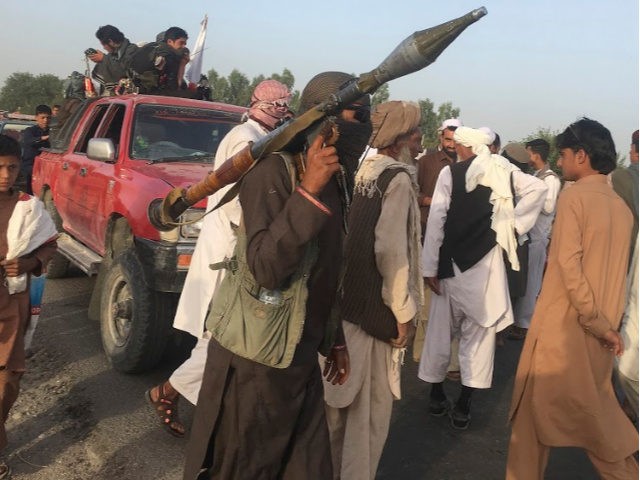Taliban narco-jihadis on Tuesday issued a statement threatening to pull the plug on peace negotiations with the United States — likely over America’s insistence that Kabul participates in the talks, a demand long rejected by the terrorist group.
Tuesday’s statement came as U.S. President Donald Trump’s reconciliation envoy, Zalmay Khalilzad, continued to make rounds in the region in pursuit of a negotiated end to the Afghan war — raging since October 2001 at a tremendous blood and treasure cost to the United States of nearly $1 trillion, over 2,270 U.S. military fatalities, and more than 20,400 injuries.
Taliban terrorists have long refused to engage in negotiations with Kabul, dismissing the Afghan government as a U.S. “puppet.”
In its statement, the group claimed the U.S. agreed in meetings in November on a two-point agenda: the withdrawal of foreign troops and guarantees that Afghanistan will not again become a safe-haven — as it was for al Qaeda prior to 9/11 — from which terrorist groups can plan and execute attacks on the United States and other countries.
Likely alluding to the U.S. demand that the Taliban hold direct talks with Kabul, the statement went on to accuse the Trump administration of seeking to expand the agenda.
The Taliban “warns Americans that if this situation continues,” the group will cancel the peace negotiations, the statement declared.
On Tuesday, the U.S. Embassy in Kabul noted that Khalilzad had arrived in the Afghan capital following stops in India, the United Arab Emirates (UAE), and China.
“Khalilzad was to meet President Ashraf Ghani, Chief Executive Abdullah Abdullah, and other political leaders to discuss the next steps in U.S. efforts to get an Afghan-led and Afghan-owned peace process started,” the Associated Press (AP) noted.
In recent months, the Trump administration boosted U.S. peace-seeking efforts in Afghanistan, making the “political reconciliation” between Kabul and the Taliban the primary goal of its strategy to end the more than 17-year-old war. Marking a departure from its predecessors long sought by the terrorist group, Trump administration officials, namely Khalilzad, have engaged in direct talks with the Taliban.
The peace talks, however, have hit a snag, mainly over America’s position that Kabul participate in the discussions.
A Taliban insurgent told Voice of America on condition of anonymity this week that the group has “halted” the fledgling U.S.-initiated peace negotiations.
Despite the ongoing talks, the U.S.-backed Afghan National Defense and Security Forces, which include military and police units, have ramped up the pressure on the terrorist group to bring it to the negotiation table with Kabul.
Last month, the U.S. Department of Defense (DOD) reported:
The key to success remains sustained military pressure against the Taliban. By convincing the Taliban that they cannot win on the battlefield, and credibly committing to a conditions-based strategy, we have greatly increased the odds of concluding a settlement on terms favorable to the United States and Afghanistan.
This week, the Special Operations Corps of the Afghan Military released a video purportedly showing Taliban jihadis blown into pieces by airstrikes.
“The Taliban militants and their leaders will no more remain hidden from the sight of the National Defense and Security Forces,” the special forces proclaimed in a statement, Khaama Press reported.
High-ranking U.S. military officials conceded last year that the United States would not achieve a military victory in Afghanistan, emphasizing that American troops are focused on a political settlement to end the war.
Pentagon officials added in the DOD report last month:
The United States has a single vital national interest in Afghanistan: to prevent it from becoming a safe-haven from which terrorist groups can plan and execute attacks against the U.S. homeland, U.S. citizens, and our interests and allies abroad. Our ultimate goal in Afghanistan is a negotiated political settlement between the Afghan government and the Taliban.
Taliban narco-jihadis who generate most of their funding from trafficking drugs — mainly opium and its heroin derivative — are part of only one of the 20 groups that make Afghanistan home to the “highest concentration” of terrorist organizations in the world, the Pentagon has repeatedly said.

COMMENTS
Please let us know if you're having issues with commenting.